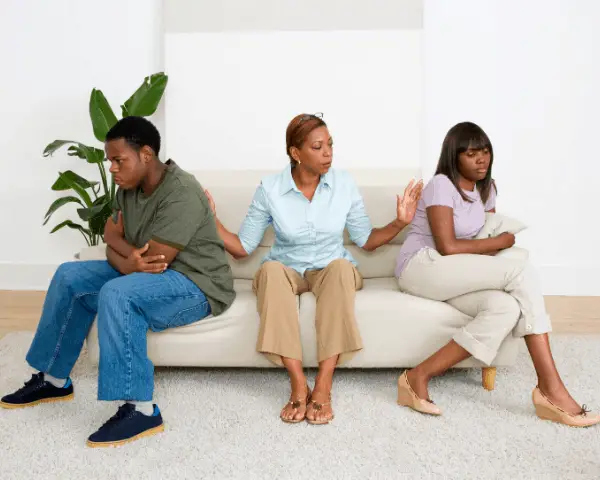Funerals are one of the most stressful events that any of us will have to attend. Whether or not you are planning the funeral yourself, the attendees can stir up several strong emotions when you clap eyes on them.
For many people, such a difficult day could be made much easier if one or more people were not allowed to attend, but is that even possible?
As the funeral organizer, you have the right to request that people not attend due to the disruption they will likely cause. Depending on the situation you can totally ban any interaction with the deceased and their final rites. However, offering a private viewing or limited attendance is an effective compromise.
Totally banning someone, especially a family member, from attending a funeral can be a highly emotional decision. In order to help you navigate this during an already stressful period of your life, I invite you to continue reading for more advice.

What justifies banning someone from a funeral
There are several types of people who you may request not to attend a funeral, all of which are valid. Some may seem more obvious than some, so let’s go through them, and hopefully, this will help you with your decision.
Children
Requesting that children not attend the entire or parts of the funeral is actually quite a valid request. There is much debate in society and different cultures about at what age a child should attend a funeral. If you are planning to have a traditional open casket, you may not wish to expose younger children to this or force the choice on families either.
There are also other issues with having children, especially younger ones, attending a funeral. Being rather somber and social affairs, younger children may become uncomfortable and noisy. This could make it harder to carry out the funeral that you envisioned for your loved-one.
Nevertheless, you, may not want to alienate young families by banning their children. A good option which may help everyone, and avoid having to explain the concept of death to young kids, is to hire a baby-sitter.
This way you can help parents out by allowing them to mourn without having to look after their children and make sure they don’t cause any disruption to other funeral-goers.
Disruptive family members
I think we can all picture who might fall into this category, but as a general description, this is the person who is going to cause a scene and make the event about themselves. Any family member who had a grudge against the deceased or another relative could quickly derail the event. If you add on any form of substance abuse or lack of self-control, this could be even more upsetting for other funeral attendees.
If there is a pre-existing feud, perhaps about money, amongst family members and this is likely to come to a head during the proceedings, you may wish to nip it in the bud beforehand.
Ex-spouses or partners
Another source of funeral strife can come from an ex-husband or wife. Assuming that banning these ex-partners isn’t vindictiveness on the planner’s part, it can be justified to ban them in some cases. If there was a particularly messy divorce or any history of abuse, then preventing these people from attending would be extremely justified.
Members of the public
If the deceased in question was in any way a prominent member of society or known within an industry, you may wish to issue a carpet ban of any non-relatives or close friends. This can be a tough decision because members of the public can develop a genuine attachment to their idols even if they never met them.
In these cases, you may wish to hold a private ceremony but offer some form of public demonstration of support. This could be a dedicated area to lay flowers or some sort of charity donation in the name of the deceased.
If you need to order flowers for a funeral then I can really recommend BloomsToday.com as I had an excellent experience buying from their site. You can check out the deals they have here, but when I ordered it was 25% off! Fingers crossed!
How to effectively stop someone from attending a funeral
The most effective method to prevent unwanted guests at a funeral is to keep the venue secret This can be done by working closely with a funeral director and by making your intentions clear to invited guests. Having access to the contact details of all the people who should be invited is essential however as you won’t be able to make a public announcement.
The obvious answer is that if the person in question doesn’t know where the funeral is they cannot crash it. However, it’s likely that they will be aware of the death in most cases, so you must be 100% sure you want to take this route.
Option one – Try to reason with them
In an ideal world, you would be able to have a civil conversation with the person you feel shouldn’t attend the actual funeral and solve all your worries before the day. If you have a very good reason to request that they don’t attend then you might want to just explain it to them. You can, if you want, offer a compromise giving them permission to view the deceased before the funeral or after the burial/cremation.
As a child or sibling etc, they may have a “right” to attend the funeral but they do not have the right to disrupt it for others.
During this conversation, if you have it, make sure that you don’t reveal too many details if you can. Certainly don’t say when the funeral is being held and don’t reveal the service you are using unless a compromise has been reached.

Option two – let other know about your plan to ban
Step one
If in your heart of heart you know that the person you want to ban cannot be reasoned with and is more than likely going to cause trouble, you need to share this concern. Find allies within your family and spread the word among key members that you are going to take this step.
Contact the funeral home you are working with and make it crystal clear what the situation is. You don’t have to go into the entire saga, but do make it clear that there are one or more people who you do not want to attend. It’s important to ask them to notify their staff so that nobody lets anything slip over the telephone or if the offender pops by.
Step two
In extreme cases, you may want to hire some form of security to stop anyone coming in who shouldn’t be there. This could be as simple as asking some friends or family members just to wait at the doors of the venue keeping an eye out for the unwanted guest. Ideally, you can make the funeral by invitation only, which would help hired security better police the funeral.
A really good way to ensure that you can keep unwanted guests out is to hold the funeral ceremony at your own home. Funeral homes can work with you to achieve this, but it will cost extra due to the transportation of the deceased from place to place.
Having the majority of the service under your own roof means that you have a very good stance to refuse entry to your own home. Not many people can argue with that.
How to hold a private ceremony (celebrity deceased)
If the people you want to ban from the funeral are the general public, then you need to follow most of the steps in Option Two mentioned above, but with a few additional steps.
Working with your funeral director is key as they will be able to best advise you about how to keep the funeral for family and friends only. Secrecy, or at least limiting the information shared publicly is key. However, for any level of celebrity, it is usual to issue a statement that mentions the fact that you wish to hold a private ceremony.
For these higher-profile funerals, a dedicated funeral security team is essential as you are much more likely to attract uninvited guests, well-meaning or not.
Postponing the funeral a few extra days or weeks, which is possible with modern refrigeration technology, will allow you to finalize a guest list which will make funeral crashing harder.
Who has the legal right to make decisions about a funeral?
In broad terms, the legal right to plan and carry out a funeral falls to the executor of a deceased person’s will. Failing that, their spouse would take legal authority and if not married, their immediate next of kin. Laws may vary state by state, so do check the exact statute in yours.
The legal right to make decisions doesn’t mean that the person is legally responsible to organize or pay for the funeral, however. The person who signs the contract with the funeral home (the executor if the deceased pre-paid it) is the customer and as they have to cover the costs they can call the shots.
So, if you are the person who is named in the will and or is footing the bill for the funeral you are absolutely within your rights to ban anyone who you feel shouldn’t attend the funeral.
I recently looked into getting a loan and I’ve actually had a good experience with Supermoney.com. For me, it was a car loan but I spoke to them about a dedicated funeral expenses loan, which is one of the services they offer, and was quite impressed. To see if you could qualify, check out my link here.
How do you tell someone to not go to a funeral?

If you are planning to ban anyone from a funeral, except perhaps for children, there is probably quite a serious reason for it. If the reason pertains in any way to violence, then don’t do this face to face.
Make sure that you discuss your decision with a loved one or two beforehand. This will help you clarify in your own mind exactly why you think this person shouldn’t attend the funeral.
Decide beforehand whether or not you want to offer a compromise so that they still have a chance to say their farewells be it alone and not during the public funeral. if you aren’t prepared to do that, be clear in your own mind why.
If you think it safe, arrange to meet the person in a neutral space and one that you will be able to leave quickly if you feel the need to. Rather at their home that yours I would say. If you can’t or don’t want to meet them, make a phone call.
If you want to take a spouse or family member to support you then you can do so, but as the funeral organizer, you need to call the shots. If dealing with your sibling, for example, don’t allow your spouse to do the talking. In the light of the death of a parent, your spouse has no authority to speak on your behalf.
Be prepared for an argument, even total disregarding of your wishes. Clearly explain how you will stop them from attending the funeral and why it would be in their best interest to stay away.
This will not be a pleasant experience anyway that you approach it, but you need to remember why you want to ban this person from the funeral.
What if everyone is against your plan to ban?
In reality, sometimes as much as we would like it to happen, banning a family member from a funeral really isn’t a popular choice. Death is one of those events that strip away a lot of the petty disputes we have in life.
If you don’t have the support of your family to attempt to stop someone from attending the funeral, then you may have to come up with another approach.
Ideally, if the unwanted guest is not welcome because of a bad relationship with a surviving family member, you need to keep them apart. You can either look for allies within the funeral party to help you keep them as far away as possible or you can try to stagger their attendance.
Although it may be unfair, you might ask the most amicable party in the feud to arrive earlier or later or to only attend part of the proceedings. How extreme this really depends on the level of disruption you expect.
Are churches public property and can you ban people from entering them?
Unlike in some countries, churches in the United States are privately owned in all cases. The US government is 100% secular (despite what’s on the money) and members of the public do not have the same rights as with public buildings.
In essence, when you hold a funeral in a church you are hiring a venue and it’s up to you whether or not you allow it to be open to the public. Although you may not have automatic legal rights to barre, anyone, from entering the church, as a consumer you can ask the establishment to work with you.
In fact, a minister can be an excellent ally when it comes to mediating between warring family factions and you may be able to enlist their help in banning or compromising with an unwanted guest.





